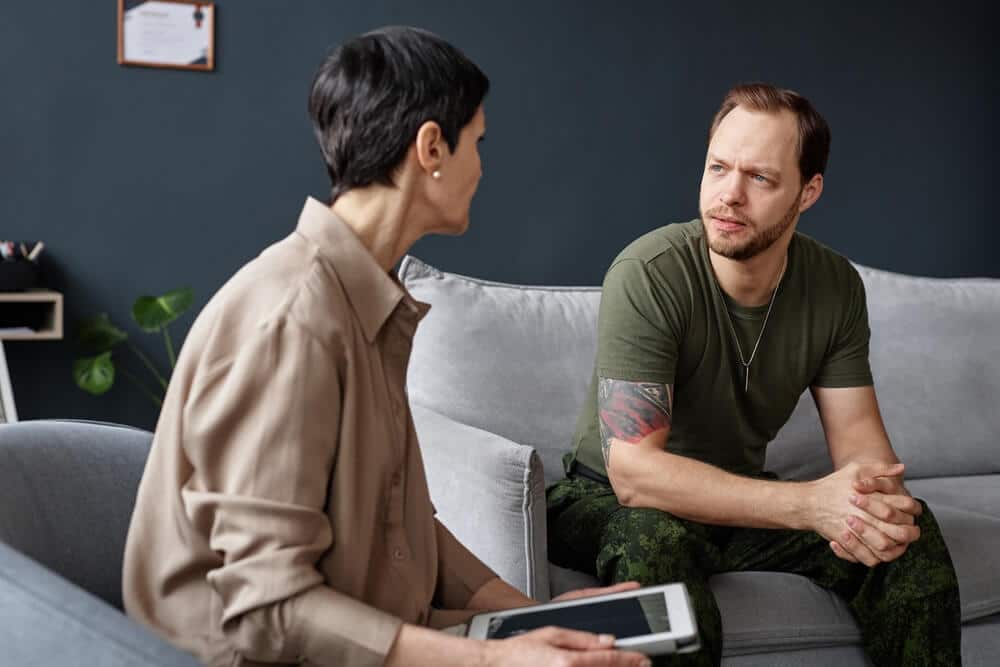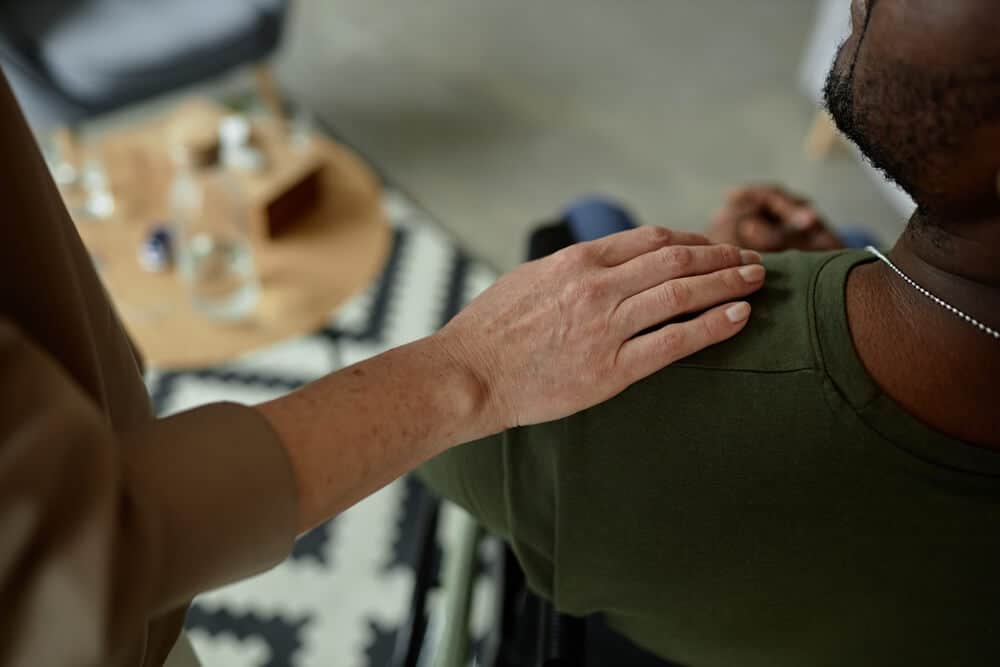Millions of Veterans annually seek care through a Veterans Affairs mental health specialty program, further highlighting the need for proven treatment access. But what is the goal of these Veteran mental health services?
Beyond the treatment of specific conditions like PTSD, Veteran mental health services strive to promote overall well-being, resilience, and social reintegration. They recognize the importance of addressing the whole person, including physical health, employment, housing stability, and family relationships, which all contribute to mental wellness.
Mental health programs for Veterans also work to reduce the stigma surrounding mental health care among Veterans, encouraging help-seeking behaviors and creating supportive communities where Veterans can connect with others who understand their experiences. Ultimately, the goal is to honor Veterans’ service by ensuring they receive the high-quality care and support they deserve to thrive in civilian life.

Why Do Veterans Need Mental Health Care?
Veterans often need specialized mental health treatment like trauma-informed care for several important reasons:
Combat exposure and trauma can lead to conditions like PTSD, with symptoms including flashbacks, nightmares, hypervigilance, and emotional numbing. Military service involves unique stressors beyond combat, including separation from family, rigorous training, and deployment to unfamiliar environments.
The transition to civilian life presents significant challenges as Veterans adjust to different social structures, career paths, and daily routines without the clear mission and camaraderie they experienced in service. Military culture sometimes emphasizes strength and self-reliance, creating barriers to seeking help for mental health concerns.
Veterans may also face physical injuries, chronic pain, or traumatic brain injuries that complicate their mental health needs. They also experience higher rates of depression, anxiety disorders, and substance use disorders compared to the general population.
Effective mental health care for Veterans acknowledges these unique experiences and provides targeted interventions that respect their service while addressing their specific needs. With proper support, Veterans can process their experiences, develop coping strategies, and successfully reintegrate into civilian life while maintaining their well-being.
Mental Health Treatment That Works
Call 949-625-0564How Do Mental Health Services Address the Needs of Veterans?
Mental health services address Veterans’ needs through multiple specialized approaches:
Evidence-based treatments tailored for military-related trauma are central to Veterans’ care. These include trauma-focused therapies like Cognitive Processing Therapy (CPT) specifically designed for PTSD. Many mental health facilities offer specialized inpatient and outpatient programs where Veterans can receive care from clinicians trained in military culture and trauma.
Peer support programs connect Veterans with others who have similar experiences, reducing isolation and providing unique understanding that civilian providers may not offer. These programs often include group therapy, peer mentoring, and veteran-led support groups. Comprehensive care coordination addresses the complex interplay between mental health, physical health, housing, employment, and social connections.
Family involvement is emphasized through couples therapy, family counseling, and education programs that help loved ones understand and support Veterans’ mental health needs. Providers increasingly use telehealth services to overcome barriers like transportation, mobility limitations, and provider shortages in rural areas.
Many services also incorporate complementary approaches like mindfulness, yoga, outdoor recreation, and art therapy alongside traditional treatments. Crisis intervention services, including 24/7 hotlines and emergency response teams, provide immediate support for Veterans in acute distress.
Most importantly, services and mental health diagnoses for Vets have evolved to be culturally responsive, with greater awareness of how diverse backgrounds and military experiences shape Veterans’ needs and help-seeking behaviors.

How Do Mental Health Services Support Transitioning Veterans?
Mental health services support transitioning Veterans through targeted programs that address the unique challenges of military-to-civilian adjustment. Many mental health treatment facilities offer transition-specific counseling that helps Veterans process the identity shift from military to civilian life, which can involve profound changes in purpose, daily structure, and social connections.
Employment services frequently partner with mental health providers to offer vocational rehabilitation, job training, resume building, and interview preparation while simultaneously addressing any mental health barriers to employment. Education liaisons help Veterans navigate GI Bill benefits and academic environments, often connecting them with campus resources specifically designed for student Veterans.
Peer mentorship programs pair newly transitioning Veterans with those who have successfully navigated civilian reintegration, providing both practical guidance and emotional support during this significant life change. Case management services coordinate across multiple systems to ensure Veterans access housing assistance, healthcare enrollment, benefits counseling, and mental health services as an integrated package rather than disconnected programs.
Skills translation workshops help Veterans recognize how their military training and experiences provide valuable capabilities in civilian contexts, boosting confidence and self-efficacy during the transition. Family reintegration services address relationship dynamics that may have changed during service, helping couples and families adjust to new routines and expectations.
How Can Mental Health Services Improve Veterans’ Quality of Life After Service?
Mental health services can significantly improve Veterans’ quality of life after service through several key mechanisms. By effectively treating conditions like PTSD, depression, and anxiety, these services help Veterans manage debilitating symptoms that might otherwise interfere with daily functioning and life satisfaction. Treatment often leads to reduced distress, improved sleep, better concentration, and enhanced emotional regulation—all fundamental to overall well-being.
Beyond symptom management, comprehensive mental health care helps Veterans rebuild meaningful relationships that may have been strained by service-related issues. Family therapy, couples counseling, and interpersonal skills training provide tools for repairing and strengthening social connections, which research consistently identifies as crucial for life satisfaction.
Mind-body approaches taught through mental health programs, such as mindfulness, stress management, and relaxation techniques, provide Veterans with lifelong skills for emotional regulation and resilience. Peer support groups create communities where Veterans can share experiences and solutions with others who truly understand, combating isolation and normalizing help-seeking behaviors.
What Is the Goal of Veteran Mental Health Services? Find Support at Moment of Clarity
The goal of Veteran mental health services is to offer specialized treatments, peer support programs, and trauma-informed care to help Veterans process their experiences, develop coping strategies, and rebuild their lives.
Each year, 200,000 service members transition to civilian life, but less than 50% of veterans are enrolled in VA healthcare. This highlights the critical need of providing mental health services for Veterans beyond what the VA offers.
As a Southern California mental health facility proudly serving military personnel and civilians in the area, Moment of Clarity provides personalized treatment to active and retired service members. We treat a bevy of mental health conditions service members typically suffer from, including PTSD, trauma, and anxiety. Our mental health offerings for Veterans, including our Operation Clarity program, are specifically designed to recognize the challenges of military life and focus on coping strategies to overcome them.
To learn more about what is the goal of Veteran mental health services and where to find help, contact Moment of Clarity at 949-625-0564 today.
External Sources
- U.S. Department of Veterans Affairs – VA research on Mental Health
- Mission Roll Call – The State of Veterans’ Mental Health [2024]
- National Library of Medicine – Veteran and Military Mental Health Issues




